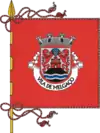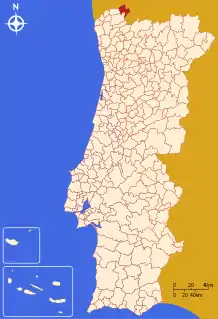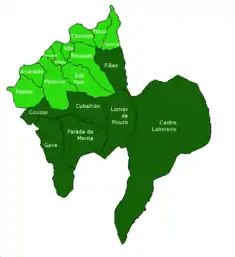Melgaço, Portugal
Melgaço (Portuguese pronunciation: [ˌmɛlˈɣasu] ⓘ) is a municipality in Viana do Castelo District in Portugal. The population in 2011 was 9,213,[1] in an area of 238.25 km².[2] It is the northernmost municipality in Portugal.
Melgaço | |
|---|---|
.jpg.webp) The view of the town of Melgaço within the valleys of the Minho River | |
 Flag  Coat of arms | |
 | |
| Coordinates: 42°06′N 8°15′W | |
| Country | |
| Region | Norte |
| Intermunic. comm. | Alto Minho |
| District | Viana do Castelo |
| Parishes | 13 |
| Government | |
| • President | Manoel Batista (PS) |
| Area | |
| • Total | 238.25 km2 (91.99 sq mi) |
| Population (2011) | |
| • Total | 9,213 |
| • Density | 39/km2 (100/sq mi) |
| Time zone | UTC±00:00 (WET) |
| • Summer (DST) | UTC+01:00 (WEST) |
| Website | http://www.cm-melgaco.pt |
The present Mayor is Manoel Batista, elected by the Socialist Party. The municipal holiday is Ascension Day.
History
Parada do Monte, Gave and the plateau of Castro Laboreiro were locations of many megalithic burial mounds and graves that suggest the presence of human settlement in the mountains of the region.[3] Alongside is the hilltop castle, that stood firm during the Galician-Leonese battles.[3]
Over the streams they built bridges in solid masonry, while dozens of fishing villages sprung from the banks of the River Minho, in addition to the Romanesque convents, churches and chapels, some of which are quite Romanesque.[3] Oral tradition suggest that the castle of Melgaço was constructed during the reign of King D. Afonso Henriques, around 1170.[3] It was this monarch that conceded to Melgaço the first forum letter, between 1183 and 1185, that was later confirmed by King D. Afonso in 1219, and replaced by a Foral (charter) issued by King D. Afonso III, in 1258. The existence of a forum letter suggests that some settlement existed on the site.[3]
The hilltop of Melgaço, overlooking the Minho River, was strategically located enroute to Galicia, in addition to terrestrial commercial routes. In the neighbourhood were the protectorates of two great monasteries, in Fiães and Paderne.[3] The small burg required further protection from Leonese forces, resulting in the construction of a larger structure, on a site that would later be erected the keep tower. It was during the reign of King D. Sancho II that the town began to be encircled by a defensive fortification.[3] Its need was already evident in the reign of King D. Afonso II, during the politico-military battles that were motivated by the monarch's struggles with his sisters.[3] Between 1211-1212, the north of Portugal was invaded by Leonese forces, justifying the construction of the wall, which was already under construction by 1245, with the help of local initiatives and the convent of Fiães.[3]
Geography

Administratively, the municipality is divided into 13 civil parishes:[4]
Climate
| Climate data for Portelinha, altitude: 1,018 m (3,340 ft), 1985-2021 | |||||||||||||
|---|---|---|---|---|---|---|---|---|---|---|---|---|---|
| Month | Jan | Feb | Mar | Apr | May | Jun | Jul | Aug | Sep | Oct | Nov | Dec | Year |
| Average precipitation mm (inches) | 229.8 (9.05) |
197.5 (7.78) |
121.9 (4.80) |
159.4 (6.28) |
113.4 (4.46) |
63.7 (2.51) |
39.3 (1.55) |
33.7 (1.33) |
90.1 (3.55) |
243.5 (9.59) |
226.7 (8.93) |
226.5 (8.92) |
1,745.5 (68.75) |
| Source: Portuguese Environment Agency[5] | |||||||||||||
Architecture
Civic
- Bridge of Cava da Velha (Portuguese: Ponte da Cava da Velha)
- Cinema Museum of Melgaço, established by French film critic Jean-Loup Passek[6]
- Fountain of São João (Portuguese: Fonte de São João)
- Settlement of Laboreiro (Portuguese: Povoado a SE. do Castelo de Povoado fortificado Laboreiro)
- Thermal Spa of Peso (Portuguese: Thermas do Peso)
Military
- Castle of Castro Laboreiro (Portuguese: Castelo de Castro Laboreiro ou Laboredo)
- Castle of Melgaço (Portuguese: Castelo de Melgaço e muralha/Castelo e cerca urbana de Melgaço)
Religious
- Church of the Divino Salvador de Paderne (Portuguese: Igreja e Convento de Paderne/Igreja Paroquial de Paderne/Igreja do Divino Salvador)
- Church of Santo André (Portuguese: Mosteiro de Fiães/Igreja Paroquial de Fiães/Igreja de Santo André)
- Church of São Martinho (Portuguese: Igreja Paroquial de Alvaredo/Igreja de São Martinho)
References
- Instituto Nacional de Estatística
- "Áreas das freguesias, concelhos, distritos e país". Archived from the original on 2018-11-05. Retrieved 2018-11-05.
- Câmara Municipal (ed.), História (in Portuguese), Melgaço, Portugal: Câmara Municipal de Melgaço, retrieved 4 May 2017
- Diário da República. "Law nr. 11-A/2013, page 552 70" (pdf) (in Portuguese). Retrieved 28 July 2014.
- "Monthly Precipitation Portelinha (01H/02G)". APA. Retrieved 4 June 2021.
- "Museu de Cinema de Melgaço Jean Loup Passek". Visit Portugal. Retrieved December 9, 2016.